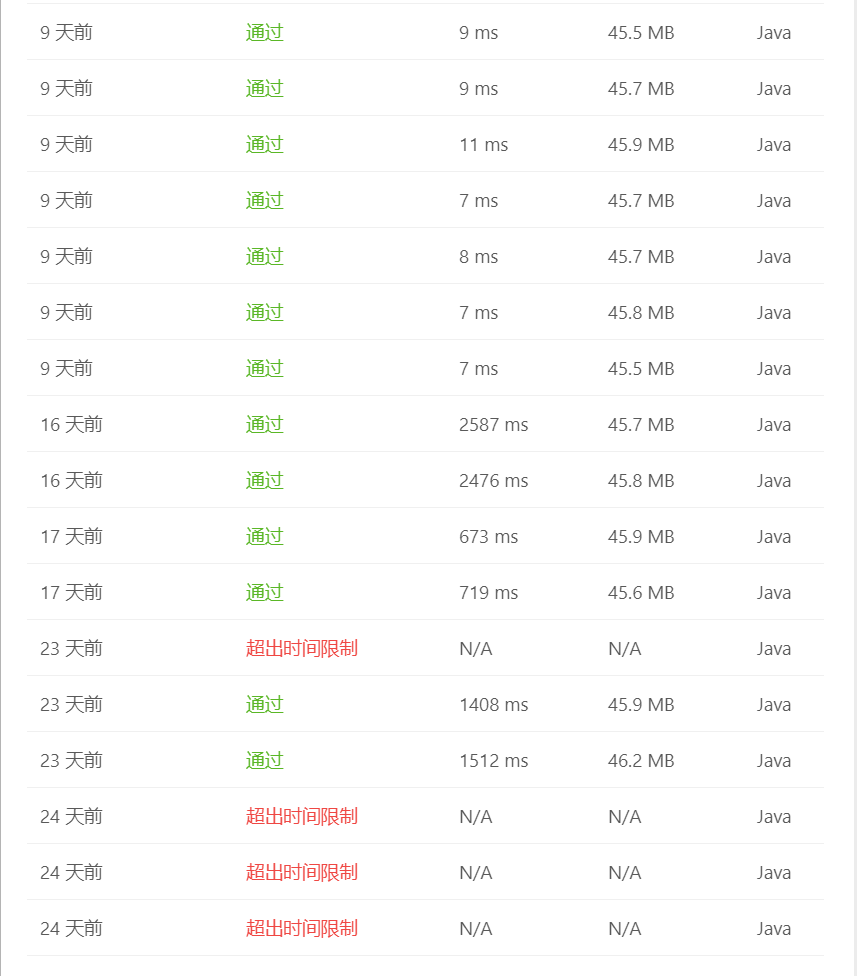mirror of
https://github.com/chefyuan/algorithm-base.git
synced 2024-11-15 00:23:39 +00:00
136 lines
6.3 KiB
Java
136 lines
6.3 KiB
Java
> 如果阅读时,发现错误,或者动画不可以显示的问题可以添加我微信好友 **[tan45du_one](https://raw.githubusercontent.com/tan45du/tan45du.github.io/master/个人微信.15egrcgqd94w.jpg)** ,备注 github + 题目 + 问题 向我反馈
|
||
>
|
||
> 感谢支持,该仓库会一直维护,希望对各位有一丢丢帮助。
|
||
>
|
||
> 另外希望手机阅读的同学可以来我的 <u>[**公众号:袁厨的算法小屋**](https://raw.githubusercontent.com/tan45du/test/master/微信图片_20210320152235.2pthdebvh1c0.png)</u> 两个平台同步,想要和题友一起刷题,互相监督的同学,可以在我的小屋点击<u>[**刷题小队**](https://raw.githubusercontent.com/tan45du/test/master/微信图片_20210320152235.2pthdebvh1c0.png)</u>进入。
|
||
|
||
#### [剑指 offer 51 数组中的逆序对](https://leetcode-cn.com/problems/shu-zu-zhong-de-ni-xu-dui-lcof)
|
||
|
||
逆序对:在数组中的两个数字,如果前面一个数字大于后面的数字,则这两个数字组成一个逆序对,见下图。
|
||
|
||

|
||
|
||
是不是很容易理解,因为数组是无序的,当较大的数,出现在较小数前面的时候,它俩则可以组成逆序对。因为数组的(有序度+逆序度)= n (n-1) / 2,逆序对个数 = 数组的逆序度,有序对个数 = 数组的有序度,所以我们知道有序对个数的话,也能得到逆序对的个数。另外我们如何通过归并排序来计算逆序对个数呢?
|
||
|
||
关键点在我们的**归并过程中**,我们先来看下归并过程中是怎么计算逆序对个数的。见下图
|
||
|
||

|
||
|
||
我们来拆解下上图,我们此时 temp1 指向元素为 6,temp2 指向元素为 2, nums[temp1] > temp[temp2],则此时我们需要将 temp2 指向的元素存入临时数组中,又因为每个小集合中的元素都是有序的,所以 temp1 后面的元素也一定大于 2,那么我们就可以根据 temp1 的索引得出逆序对中包含 2 的逆序对个数,则是 mid - temp + 1。
|
||
|
||
好啦这个题目你已经会做啦,下面我们一起来做下吧。
|
||
|
||
**题目描述**
|
||
|
||
在数组中的两个数字,如果前面一个数字大于后面的数字,则这两个数字组成一个逆序对。输入一个数组,求出这个数组中的逆序对的总数。
|
||
|
||
**示例 1:**
|
||
|
||
> 输入: [7,5,6,4]
|
||
> 输出: 5
|
||
|
||
**题目解析**
|
||
|
||
各位如果忘记归并排序的话,可以再看一下咱们之前的文章回顾一下 [归并排序详解](https://mp.weixin.qq.com/s/YK43J73UNFRjX4r0vh13ZA),这个题目我们仅仅在归并排序的基础上加了一行代码。那就是在归并过程时,nums[temp2] < nums[temp1] 时统计个数。下面我们直接看代码吧。
|
||
|
||
**题目代码**
|
||
|
||
Java Code:
|
||
|
||
```java
|
||
class Solution {
|
||
//全局变量
|
||
private int count;
|
||
public int reversePairs(int[] nums) {
|
||
count = 0;
|
||
merge(nums,0,nums.length-1);
|
||
return count;
|
||
}
|
||
|
||
public void merge (int[] nums, int left, int right) {
|
||
|
||
if (left < right) {
|
||
int mid = left + ((right - left) >> 1);
|
||
merge(nums,left,mid);
|
||
merge(nums,mid+1,right);
|
||
mergeSort(nums,left,mid,right);
|
||
}
|
||
|
||
}
|
||
|
||
public void mergeSort(int[] nums, int left, int mid, int right) {
|
||
|
||
int[] temparr = new int[right-left+1];
|
||
int index = 0;
|
||
int temp1 = left, temp2 = mid+1;
|
||
|
||
while (temp1 <= mid && temp2 <= right) {
|
||
|
||
if (nums[temp1] <= nums[temp2]) {
|
||
temparr[index++] = nums[temp1++];
|
||
} else {
|
||
//增加的一行代码,用来统计逆序对个数
|
||
count += (mid - temp1 + 1);
|
||
temparr[index++] = nums[temp2++];
|
||
}
|
||
}
|
||
|
||
if (temp1 <= mid) System.arraycopy(nums,temp1,temparr,index,mid-temp1+1);
|
||
if (temp2 <= right) System.arraycopy(nums,temp2,temparr,index,right-temp2+1);
|
||
System.arraycopy(temparr,0,nums,left,right-left+1);
|
||
}
|
||
}
|
||
```
|
||
|
||
Python Code:
|
||
|
||
```python
|
||
from typing import List
|
||
class Solution:
|
||
count = 0
|
||
def reversePairs(self, nums: List[int])->int:
|
||
self.count = 0
|
||
self.mergeSort(nums, 0, len(nums) - 1)
|
||
return self.count
|
||
|
||
def mergeSort(self, arr: List[int], left: int, right: int):
|
||
if left < right:
|
||
mid = left + ((right - left) >> 1)
|
||
self.mergeSort(arr, left, mid)
|
||
self.mergeSort(arr, mid + 1, right)
|
||
self.merge(arr, left, mid, right)
|
||
|
||
# 归并
|
||
def merge(self, arr: List[int], left: int, mid: int, right: int):
|
||
# 第一步,定义一个新的临时数组
|
||
temparr = [0] * (right - left + 1)
|
||
temp1 = left
|
||
temp2 = mid + 1
|
||
index = 0
|
||
# 对应第二步,比较每个指针指向的值,小的存入大集合
|
||
while temp1 <= mid and temp2 <= right:
|
||
if arr[temp1] <= arr[temp2]:
|
||
temparr[index] = arr[temp1]
|
||
index += 1
|
||
temp1 += 1
|
||
else:
|
||
self.count += (mid - temp1 + 1)
|
||
temparr[index] = arr[temp2]
|
||
index += 1
|
||
temp2 += 1
|
||
# 对应第三步,将某一集合的剩余元素存到大集合中
|
||
if temp1 <= mid:
|
||
temparr[index: index + mid - temp1 + 1] = arr[temp1: temp1 + mid - temp1 + 1]
|
||
if temp2 <= right:
|
||
temparr[index: index + right - temp2 + 1] = arr[temp2: temp2 + right - temp2 + 1]
|
||
|
||
# 将大集合的元素复制回原数组
|
||
arr[left: left + right- left + 1] = temparr[0: right - left + 1]
|
||
```
|
||
|
||
好啦,这个题目我们就解决啦,哦对,大家也可以顺手去解决下这个题目。leetcode 912 排序数组,这个题目大家可以用来练手,因为有些排序算法是面试高频考点,所以大家可以防止遗忘,多用这个题目进行练习,防止手生。下面则是我写文章时代码的提交情况,冒泡排序怎么优化都会超时,其他排序算法倒是都可以通过。
|
||
|
||

|
||
|
||
好啦,下面我们继续做一个题目吧,也完全可以用归并排序解决,稍微加了一丢丢代码,但是也是很好理解的。感谢支持
|